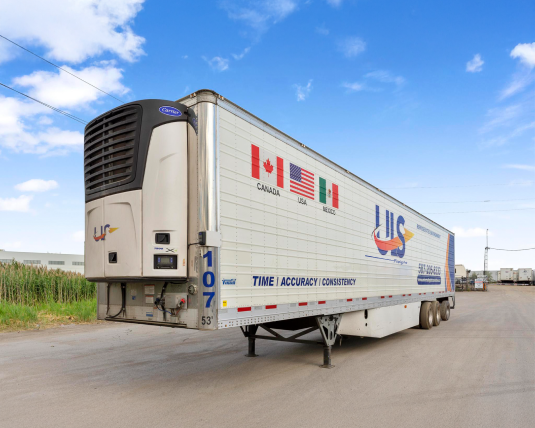Texas to Ontario Reefer Shipping: Cold Chain Solutions You Can Trust
- ULS Freight

When it comes to moving temperature-sensitive goods across borders, Texas to Ontario reefer shipping is one of the most vital logistics solutions for businesses. Whether it’s fresh produce from Texas farms, frozen foods, or life-saving pharmaceuticals, keeping cargo at the right temperature can mean the difference between success and costly losses. That’s why more companies are prioritizing cold chain logistics USA–Canada to protect their perishable shipments.
As a shipper, you’re not just looking for a trucking company—you’re looking for peace of mind. You want to know your goods will cross thousands of miles and a busy international border without temperature fluctuations, delays, or compliance issues. This is where reefer freight services Texas–Ontario provide true value. In this guide, we’ll explore the routes, industries, compliance needs, technologies, and cost factors behind cross-border reefer trucking, so you can make informed choices for your supply chain.
What is Reefer Shipping and Why It Matters
If you’re new to logistics, the term reefer freight may sound unfamiliar. A “reefer” is simply a refrigerated truck or container designed to transport goods under strict temperature control. From frozen vegetables to vaccines, the reefer is the backbone of temperature-controlled shipping across long distances. For shippers moving goods between Texas and Ontario, reefer trucking ensures products arrive fresh, safe, and compliant with health and safety regulations.
Key reasons reefer shipping matters for your business:
- Protects product integrity – Prevents spoilage, contamination, or damage during transit.
- Supports compliance – Meets FDA, CFIA, and USMCA requirements for perishables.
- Enables cross-border trade – Opens doors to Canadian markets for Texas suppliers.
- Increases reliability – Maintains consistent quality despite long-haul distances.
For companies that rely on the cold chain logistics USA–Canada, reefer shipping is more than transport—it’s your insurance policy against loss. Imagine a truck carrying vaccines in peak summer heat or frozen seafood headed to Toronto’s markets. Without temperature-controlled trucking, the shipment could spoil, costing millions in wasted inventory and brand damage. That’s why reefer shipping is not just a service, but an essential link in modern supply chains.
Texas to Ontario Cold Chain Shipping Routes
The corridor between Texas and Ontario is one of the busiest for refrigerated trucking Texas to Ontario, connecting U.S. producers with Canadian distributors and retailers. Because of Texas’s role as a major food, produce, and pharmaceutical hub, demand for reefer services continues to grow. Routes vary depending on origin city, but all share the same priority: fast, reliable, temperature-controlled delivery.
The main shipping corridors include:
- Dallas–Toronto refrigerated trucking: A direct route feeding Ontario’s largest metro market.
- Houston–Ontario reefer transport: Serving chemicals, seafood, and frozen food exports.
- Austin & San Antonio reefer freight corridors: Supplying fresh produce, meats, and beverages.
For shippers, each route offers different advantages. Dallas to Toronto is the fastest and most direct, while Houston supports bulk export shipments with access to ports. Austin and San Antonio provide vital agricultural and fresh produce supplies. Regardless of the route, Texas to Ontario cross-border shipping requires coordination, compliance, and real-time monitoring to keep cargo safe.
Industries That Rely on Reefer Shipping
If you’re in a business that depends on freshness or precise climate control, reefer freight services Texas–Ontario are non-negotiable. These industries rely heavily on perishable goods transportation:
- Frozen food transport USA–Canada: Frozen meats, seafood, poultry, and prepared meals must arrive in Ontario at precise sub-zero temperatures.
- Pharmaceutical cold chain shipping: Vaccines, insulin, and other sensitive medications require strict climate consistency.
- Fresh produce & beverages: Texas farms export fruits, vegetables, and drinks to Canadian retailers.
- Specialty chemicals & cosmetics: Some chemicals and cosmetics degrade if exposed to heat.
For these industries, temperature-controlled shipping is about protecting both health and business. A single spoiled load could result not only in financial loss but also in regulatory violations and reputational damage. If you’re supplying Canadian supermarkets, hospitals, or distribution hubs, reefer container transport Texas to Canada ensures you meet customer expectations every single time.
Cross-Border Reefer Shipping & Customs Compliance
Moving goods internationally isn’t just about trucks—it’s about paperwork, compliance, and security. With cross-border reefer trucking, there are strict requirements for customs clearance, bonded carriers, and compliance with the USMCA trade agreement. A missed document or non-compliant carrier could mean costly border delays and product spoilage.
Here’s what you’ll need to ensure smooth cross-border reefer shipping:
- Required documents for perishable shipments – Bills of lading, certificates of origin, health documents.
- Bonded carriers for reefer freight – Required to transport goods that have not yet cleared customs.
- Cold chain security checks – To verify that reefer units meet U.S. and Canadian safety standards.
- USMCA compliance – Ensures your goods qualify for tariff benefits under the trade agreement.
Working with a logistics partner experienced in customs clearance reefer shipping makes the difference between a smooth transit and a spoiled load stuck at the border. When transporting perishables, delays aren’t just inconvenient—they’re disastrous. That’s why professional carriers prioritize compliance and documentation at every step of the journey.
Reefer Technology & Real-Time Monitoring
One of the biggest advancements in cold chain logistics USA–Canada has been technology. Today’s reefer trucks don’t just cool your goods—they monitor, track, and protect them every mile of the journey. For shippers moving products from Texas to Ontario, these tools give you transparency and confidence.
Modern reefer technology includes:
- GPS tracking – Know the exact location of your shipment in real time.
- Temperature sensors – Get continuous updates on internal reefer conditions.
- IoT reefer monitoring – Automated alerts if temperatures shift outside set ranges.
- Driver and dispatch connectivity – Allows for immediate corrective action if issues arise.
By leveraging this technology, temperature-controlled shipping becomes safer and more reliable. Whether you’re a food distributor or pharmaceutical supplier, you can track your shipment from Dallas to Toronto and know that your cargo hasn’t left its required temperature range. It’s not just shipping—it’s full visibility of your cold chain.
Cost of Reefer Shipping from Texas to Ontario
Shippers often ask: “How much does reefer shipping cost from Texas to Ontario?” The answer depends on multiple factors, but understanding the breakdown helps you optimize costs.
Factors influencing reefer freight rates:
- Distance & route – Longer routes (e.g., Houston–Ontario) generally cost more than Dallas–Toronto.
- Type of cargo – Frozen goods vs. pharmaceuticals require different compliance and monitoring.
- Urgency – Expedited shipments raise costs.
- Market demand & fuel prices – Seasonal spikes in produce or fuel can affect rates.
On average, refrigerated trucking quotes for Texas to Ontario are higher than dry van shipping due to specialized equipment, monitoring, and compliance. But by working with experienced providers, shippers can reduce costs through route optimization, load consolidation, and 3PL partnerships. In the long run, the cost of reefer shipping is small compared to the risk of losing an entire load.
Choosing a Reliable Reefer Shipping Partner
When it comes to reefer trucking Texas to Ontario, not all logistics partners are equal. The wrong choice can mean spoiled shipments, compliance failures, and unhappy customers. The right partner becomes an extension of your supply chain, ensuring your cold chain integrity is never compromised.
What to look for in a shipping partner:
- Experience with perishables & pharmaceuticals – Expertise in handling sensitive goods.
- Safety, compliance & temperature guarantees – Proven protocols for protecting cargo.
- 3PL cold chain logistics expertise – Ability to integrate multiple transport modes, warehousing, and monitoring.
- Strong cross-border track record – Familiarity with U.S. and Canadian customs.
A trusted provider doesn’t just move freight—they help you build a resilient cold chain. By partnering with professionals in cold chain 3PL logistics, you gain confidence that your shipments will arrive safe, compliant, and on time, no matter the challenges along the way.
Challenges in Reefer Shipping (And How to Solve Them)
Despite advancements, reefer container transport Texas to Canada still comes with challenges. Weather, border delays, and equipment failures can all threaten shipment integrity. For shippers, the key is not avoiding challenges, but preparing for them with the right strategies.
Common challenges include:
- Border delays – Customs backlogs or inspections can cause spoilage.
- Equipment breakdowns – Reefer units must be regularly maintained.
- Driver shortages – Limited reefer-qualified drivers in busy seasons.
- Weather disruptions – Texas heat or Ontario winters can strain reefer systems.
The solution lies in proactive logistics planning. Choosing bonded carriers for reefer freight, using technology-enabled monitoring, and working with experienced 3PLs ensures problems are solved before they escalate. By anticipating risks, shippers can maintain reliable cold chain performance even under pressure.
Conclusion
In today’s global market, Texas to Ontario reefer shipping is more than a service—it’s a critical safeguard for your products and your reputation. Whether you’re moving frozen foods, pharmaceuticals, or fresh produce, you need logistics partners that understand compliance, technology, and the unique challenges of cross-border reefer trucking.
By investing in reliable cold chain logistics USA–Canada, you gain peace of mind that your perishable goods will arrive safely, consistently, and ready for market. For shippers, the choice isn’t just about moving freight—it’s about protecting customers, brand trust, and long-term success.
FAQs – Texas to Ontario Reefer Shipping
Transit times vary depending on origin and destination. Dallas–Toronto typically takes 2–3 days, while Houston–Ontario can take 3–5 days. Factors like border delays and weather can extend transit, which is why refrigerated trucking Texas to Ontario relies on professional planning.
Yes. With modern temperature-controlled shipping, frozen foods stay within required ranges throughout the journey. Using GPS tracking and IoT monitoring, reefer carriers guarantee that loads arrive frozen and compliant with Canadian food safety standards.
At minimum, you’ll need a bill of lading, commercial invoice, certificate of origin, and health certificates for perishables. Partnering with a carrier experienced in customs clearance reefer shipping ensures all paperwork is correct and avoids border delays.
No. While frozen food transport USA–Canada is common, pharmaceuticals, specialty chemicals, cosmetics, and even certain electronics rely on pharmaceutical cold chain shipping or reefer trucking. Any product that degrades with temperature changes needs reefer solutions.
Look for companies that specialize in reefer freight services Texas–Ontario, have a strong track record in cross-border logistics, and offer real-time monitoring. A good partner will also help with cost optimization and customs clearance.
About ULS Freight
We are Road freight forwarder based in Canada, and offering our road freight services all across the USA, Canada, and Mexico for the last 10 years.
Recent Posts

The Global Supply Chain Crisis: How Logistics Companies Are Responding

Cross-Border Freight Challenges: Navigating Compliance in a Global Market

